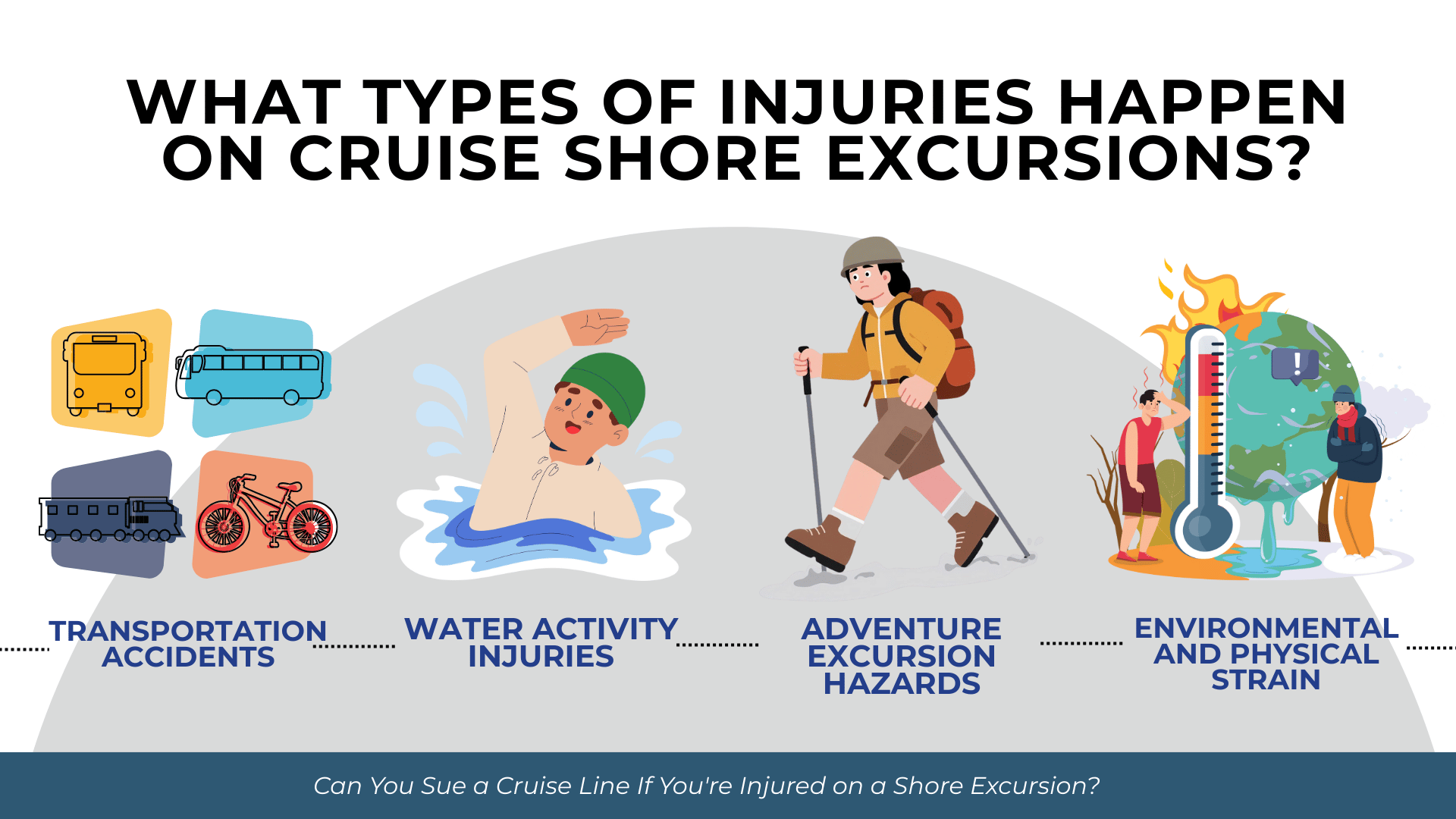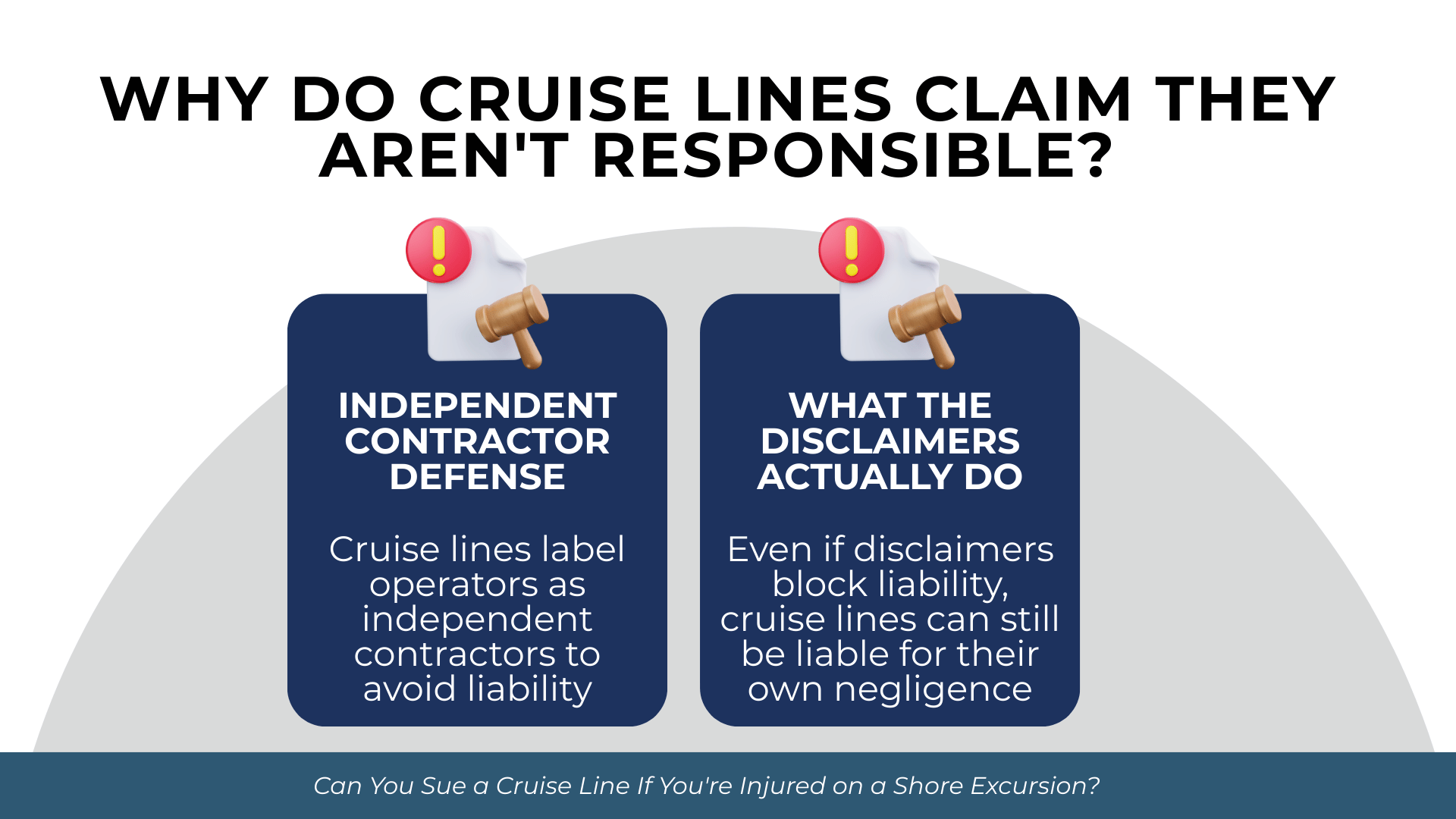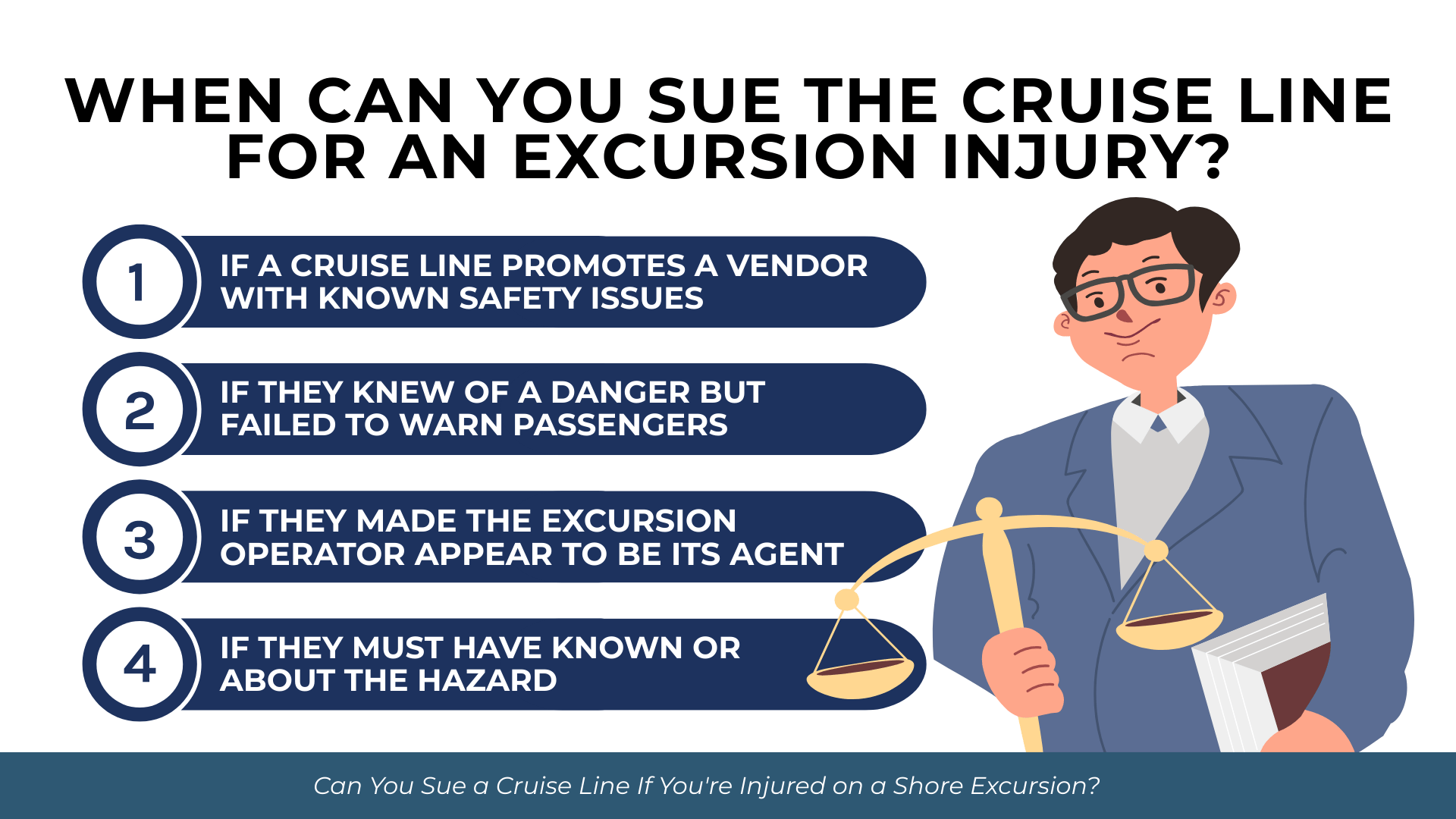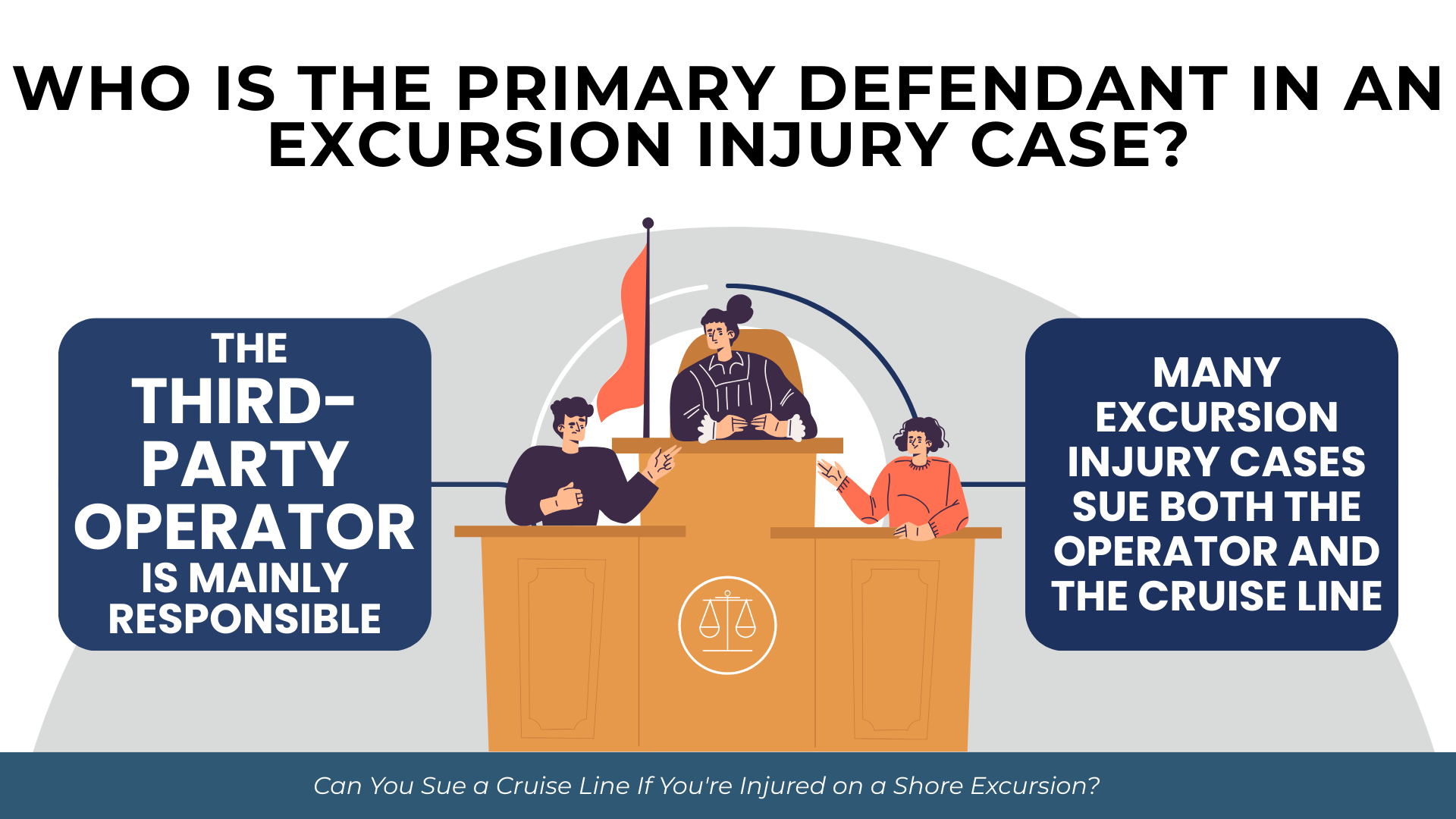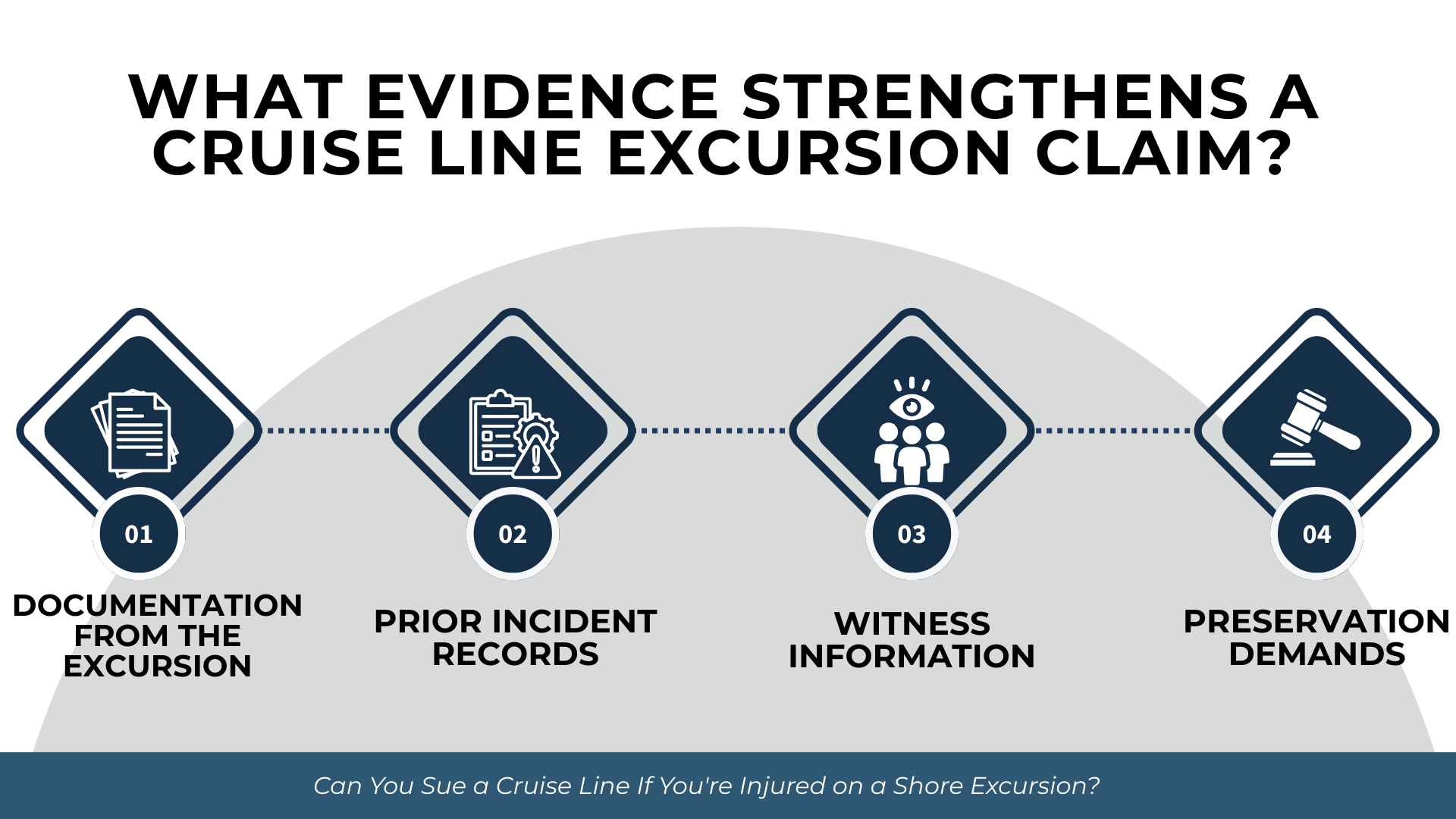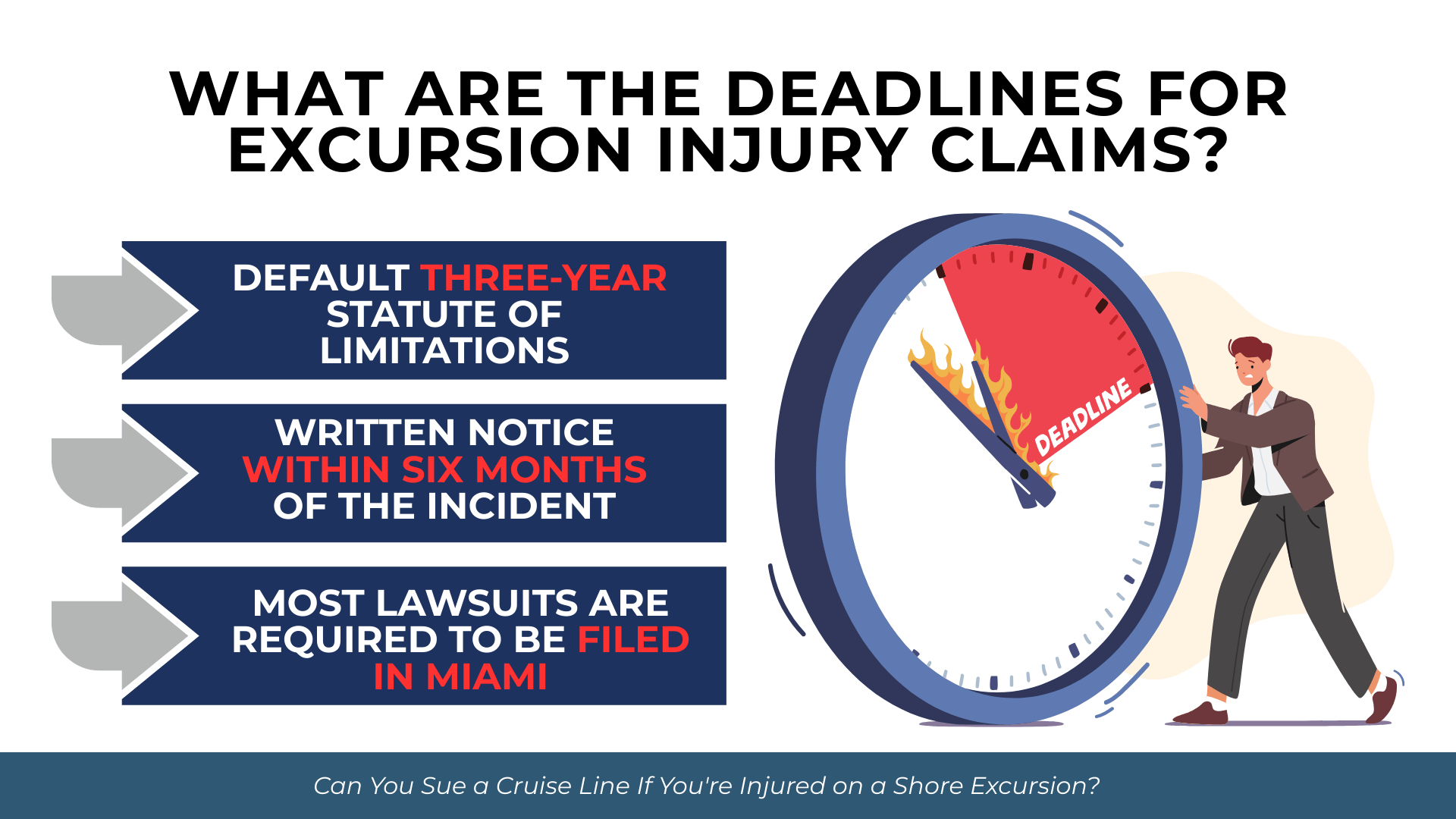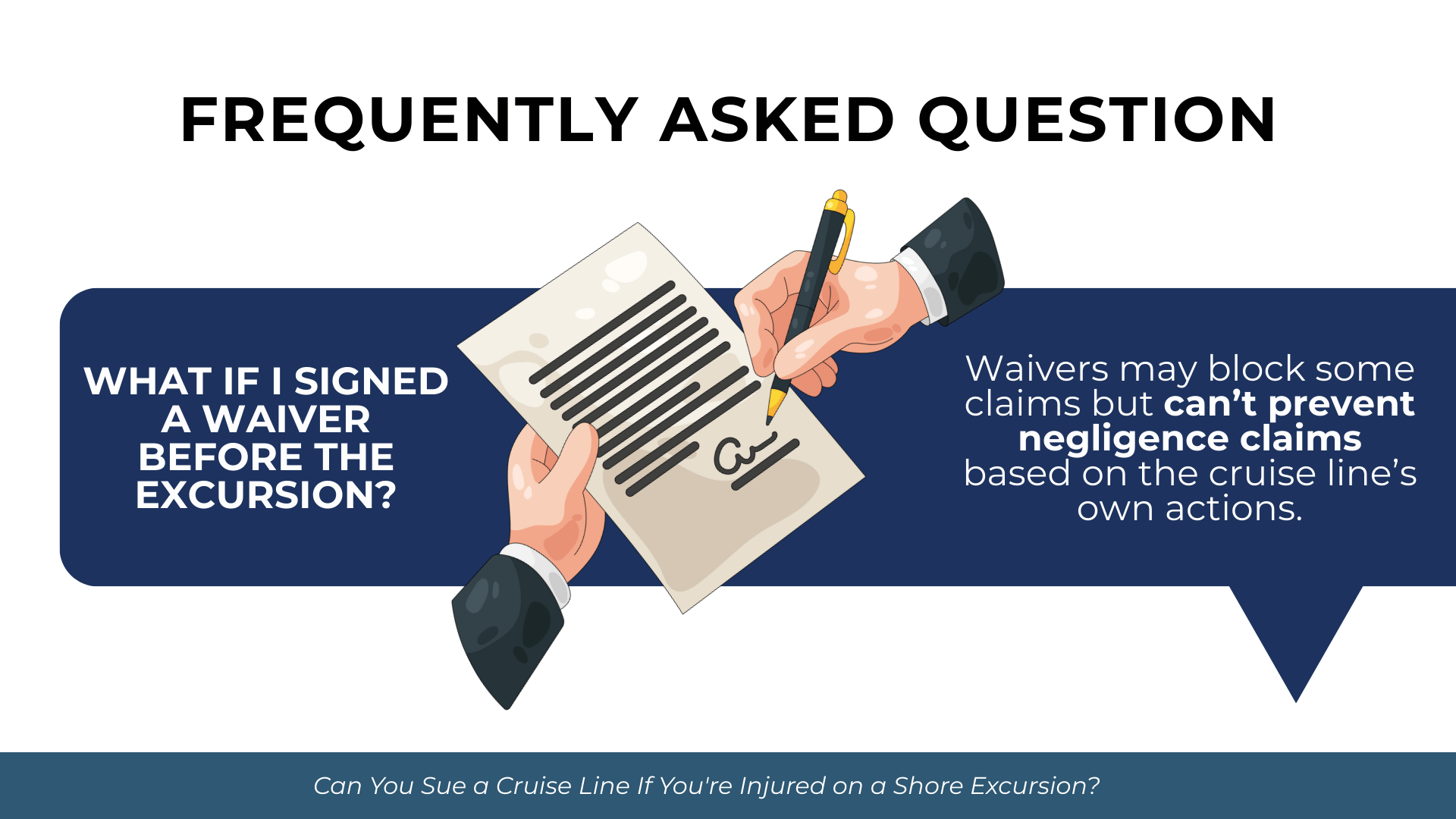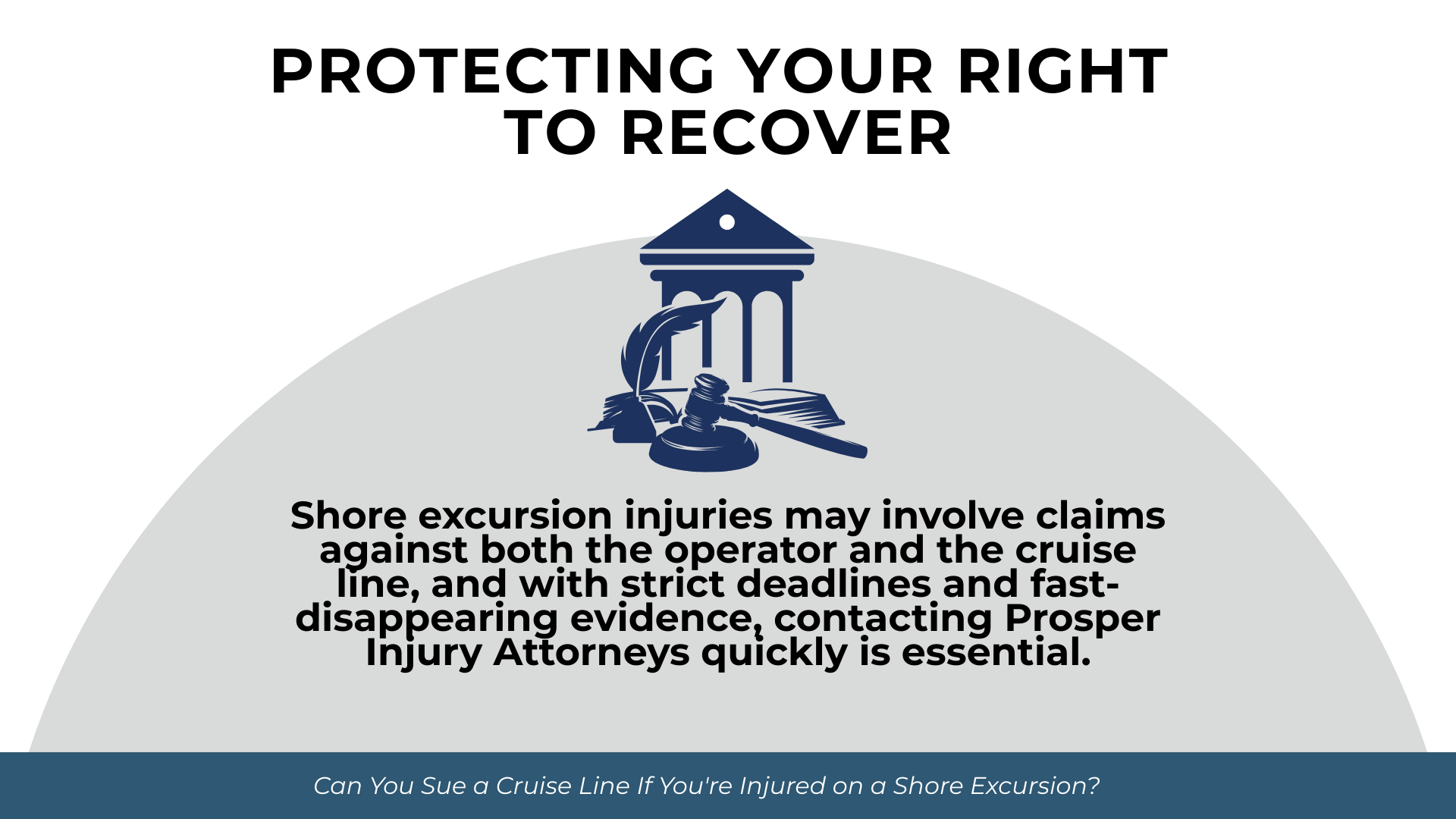Shore excursions are a major reason passengers book cruises in the first place. Snorkeling in the Caribbean, zip-lining through a rainforest, riding ATVs along a coastal trail—these experiences define the trip. But when an excursion goes wrong and you’re seriously injured, a difficult question emerges: can you hold the cruise line responsible, or does the blame fall entirely on the third-party operator?
The answer depends on what the cruise line knew, what they told you, and whether they played a role in putting you in harm’s way. Cruise lines routinely use contractual disclaimers to distance themselves from excursion operators, but those disclaimers don’t provide complete protection. Under federal maritime law, cruise lines can be held directly liable for their own negligence in selecting vendors, failing to warn of known dangers, or misrepresenting the nature of the operator relationship.
This article explains when cruise line liability exists, what types of excursion injuries occur, and what steps you need to take to protect your claim.
What Types of Injuries Happen on Cruise Shore Excursions?
A substantial share of serious cruise-related injuries happen off the ship during shore excursions. Local conditions, unfamiliar terrain, and varying operator safety standards create risks that passengers may not anticipate. Understanding these hazard categories helps clarify why cruise line oversight matters.
Transportation accidents
Road safety varies dramatically by country. Bus crashes, van collisions, and unsafe road conditions have caused serious injuries in multiple cruise ports. Seatbelts may not be standard equipment in some vehicles, and driver training standards differ from what American passengers expect. When cruise lines contract with transportation providers, they accept some responsibility for vetting those operators.
Water activity injuries
Water-based excursions present multiple injury mechanisms:
- Snorkeling and diving incidents. Currents, equipment malfunctions, and inadequate supervision have led to drownings and near-drownings.
- Jet ski collisions. Rider inexperience combined with crowded waterways creates collision risks.
- Parasailing failures. Towline breaks or equipment failures can cause falls from significant heights.
- Banana boat and tube accidents. Sudden turns or high speeds throw passengers into the water or into each other.
- Catamaran and sailing injuries. Shifting booms, slippery decks, and sudden maneuvers cause falls and impact injuries.
These activities involve inherent physical risk, but that risk increases when operators cut corners on equipment maintenance or crowd too many participants onto a single outing.
Adventure excursion hazards
ATV and UTV rollovers rank among the most severe excursion accident types. Zipline collisions, hard landings, and equipment failures cause broken bones and head injuries. Cave-tubing trips involve slippery surfaces and low-visibility conditions. Hiking excursions over ruins, jungle trails, or volcanic terrain lead to falls when footing is uncertain.
Environmental and physical strain
Heat exhaustion and dehydration affect passengers who underestimate tropical conditions. Unfamiliar footing—cobblestones, uneven steps, jungle paths—contributes to stumbles and falls. Wildlife encounters during horseback riding or stingray interactions can produce unpredictable injuries from falls, bites, or sudden animal movements.
Why Do Cruise Lines Claim They Aren’t Responsible?
Call us today at (305) 694-2676 or
contact us online for a free case evaluation.
Hablamos español.


When passengers report excursion injuries, cruise lines frequently point to the fine print in their ticket contracts. Understanding this defense—and its limits—is essential for anyone considering a claim.
The independent contractor defense
Cruise line contracts explicitly label shore excursion operators as independent contractors. These disclaimers serve a specific legal function: they can prevent the cruise line from being held vicariously liable for the operator’s negligence. The distinction matters. Vicarious liability would make the cruise line automatically responsible for the operator’s mistakes, the same way an employer is responsible for an employee’s on-the-job negligence. By labeling operators as independent contractors, cruise lines attempt to sever that automatic connection.
What the disclaimers actually do (and don’t do)
Here’s what many injured passengers don’t realize: those disclaimers block one path to recovery but leave another path open. Federal courts have recognized that even when contractual language prevents vicarious liability claims, cruise lines can still be held liable for their own direct negligence. The cruise line’s conduct—not just the operator’s conduct—becomes the focus.
This means the legal question shifts from “did the operator make a mistake?” to “did the cruise line make a mistake in selecting that operator, warning passengers about known risks, or representing who was actually providing the excursion?”
When Can You Sue the Cruise Line for an Excursion Injury?
According to Smolnikar v. Royal Caribbean Cruises Ltd., 787 F. Supp. 2d 1308 (S.D. Fla. 2011), federal maritime law allows passengers to pursue cruise lines under a direct negligence theory. The key is establishing that the cruise line’s own conduct—separate from the operator’s negligence—contributed to the harm.
Negligent vendor selection
Cruise lines have relationships with dozens of excursion vendors at each port. If a cruise line selects and promotes a vendor with a documented history of safety problems, that selection itself may constitute negligence. Prior accidents, equipment failures, regulatory violations, or complaints from previous passengers can all establish that the cruise line should have known the vendor posed a risk.
Failure to warn of known dangers
Even if the cruise line didn’t create the dangerous condition, they may be liable for failing to warn passengers about risks they knew existed. Under federal maritime law, this requires showing the cruise line had actual or constructive notice of the danger.
Several factors can establish that the cruise line had knowledge of excursion risks:
- Prior incident reports. Previous injuries on the same excursion with the same operator.
- Passenger complaints. Written complaints about safety conditions, equipment, or operator conduct.
- Industry knowledge. Known hazards associated with specific activity types at specific ports.
- Operator communications. Safety reports, insurance claims, or regulatory citations shared with or accessible to the cruise line.
- Duration of the relationship. Long-standing vendor relationships create greater opportunity—and responsibility—to identify safety patterns.
Misrepresentation of the operator relationship
If the cruise line presented the excursion operator as an agent or employee—through marketing materials, crew statements, or booking procedures—and a passenger reasonably relied on that presentation, the cruise line may be liable based on apparent agency. The question is whether the passenger had reason to believe the cruise line stood behind the operator.
The notice requirement applies
The notice requirement established in Keefe v. Bahama Cruise Line, 867 F.2d 1318 (11th Cir. 1989), applies to excursion claims just as it applies to onboard injury claims. The cruise line must have had actual or constructive notice of the dangerous condition. For excursion claims, this typically means notice of the vendor’s safety record or notice of specific hazards associated with the activity.
Who Is the Primary Defendant in an Excursion Injury Case?
Understanding the relationship between the excursion operator and the cruise line helps clarify how these cases are structured.
The excursion operator’s direct liability
The third-party operator is primarily responsible for the direct negligence that causes an injury. If a zipline cable wasn’t properly maintained, if a jet ski operator was reckless, if an ATV guide led passengers over unsafe terrain—the operator bears primary responsibility. This means the operator is often the first defendant named in an excursion injury case.
Strategic considerations for naming defendants
Many excursion injury claims name both the operator and the cruise line as defendants. This approach makes sense for several reasons. First, the cruise line typically has greater financial resources than a small foreign tour operator. Second, the cruise line’s conduct in selecting and promoting the vendor may represent an independent basis for liability. Third, maritime law applies pure comparative negligence under United States v. Reliable Transfer Co., 421 U.S. 397 (1975), meaning each defendant pays only their proportionate share of fault—but the injured passenger can still recover from multiple responsible parties.
What Evidence Strengthens a Cruise Line Excursion Claim?
Get started with your complimentary case evaluation today;
call us at (305) 694-2676 or reach us online using our
secure contact form.


Building a strong claim requires documentation that connects the cruise line’s knowledge to the conditions that caused your injury.
Documentation from the excursion
Passengers should try to preserve the following types of evidence:
- Photographs and videos. Conditions at the scene, equipment used, safety gear provided.
- Medical records. Treatment received at the ship’s medical center or at a shoreside facility.
- Written materials. Safety briefings, waiver forms, promotional materials from the cruise line.
- Receipts and booking confirmations. Documentation showing how the excursion was marketed and sold.
- Clothing and equipment. Items that may show defects or failures.
- Digital records. Timestamps, GPS data, social media posts from the date of the incident.
Prior incident records
Discovery in excursion injury litigation often targets the cruise line’s internal records regarding the vendor. Previous complaints, incident reports, insurance claims, and communications about safety concerns can establish constructive notice. If the cruise line knew about prior problems and continued promoting the excursion anyway, that knowledge becomes central to the case.
Witness information
Other passengers who observed the conditions or the accident itself can provide crucial testimony. Crew members who interacted with the vendor or processed passenger complaints may have relevant information. The excursion guide’s statements immediately after the incident should be documented if possible.
Preservation demands
Cruise lines have a duty to preserve evidence when litigation is reasonably foreseeable. Passengers or their attorneys should send a formal litigation hold letter as soon as possible, requesting that the cruise line preserve CCTV footage, incident reports, vendor contracts, safety inspection records, and marketing materials related to the excursion. Evidence is often auto-overwritten within 7-30 days if no preservation request is made.
What Are the Deadlines for Excursion Injury Claims?
Maritime injury claims are subject to strict deadlines, and cruise line contracts often impose even shorter time limits.
The one-year filing deadline
Federal maritime law provides a default three-year statute of limitations under 46 U.S.C. § 30106. However, cruise lines routinely shorten this period to one year through their ticket contracts, as permitted by 46 U.S.C. § 30508. This means you may have far less time than you expect to file a lawsuit. Missing the deadline typically bars the claim entirely.
Notice requirements
Many cruise contracts also require passengers to provide written notice of their intent to pursue a claim within six months of the incident. Failure to comply with notice requirements can bar claims even when they’re filed within the one-year limitation period. Reviewing your ticket contract immediately after an injury is essential to understanding exactly what deadlines apply.
The Miami venue requirement
Most major cruise lines require all lawsuits to be filed in the U.S. District Court for the Southern District of Florida (Miami Division). The Supreme Court upheld the enforceability of these forum-selection clauses in Carnival Cruise Lines, Inc. v. Shute, 499 U.S. 585 (1991), even when passengers live thousands of miles away. This means working with an attorney who practices in Miami and understands federal maritime law becomes particularly important.
How Does Passenger Conduct Affect an Excursion Claim?
Cruise lines frequently argue that the passenger’s own behavior contributed to their injury. Understanding how maritime law treats these arguments helps set realistic expectations.
Alcohol and assumption of risk
Alcohol consumption during shore excursions is common, and alcohol is involved in a significant share of serious cruise-related accidents. If intoxication affected a passenger’s judgment or physical coordination, the cruise line will likely raise this as a defense. However, under pure comparative negligence, alcohol use reduces the recovery—it doesn’t eliminate the claim entirely.
Ignoring warnings and instructions
Passengers who bypass roped-off areas, disregard safety instructions, or take unnecessary risks may see their damages reduced. The principle of pure comparative negligence, established in United States v. Reliable Transfer Co., 421 U.S. 397 (1975), means that damages are reduced by the passenger’s percentage of fault but are never barred entirely—even if the passenger is found 99% responsible. This plaintiff-friendly standard ensures that even passengers who made mistakes can recover something if the cruise line or operator also bears fault.
Frequently Asked Questions
Can I sue both the excursion operator and the cruise line?
Yes. Many excursion injury claims name both the third-party operator and the cruise line as defendants. The operator is typically the primary defendant for direct negligence, while the cruise line may be liable for negligent vendor selection, failure to warn, or misrepresentation. Pure comparative negligence allows recovery from multiple parties based on their respective shares of fault.
What if I signed a waiver before the excursion?
Waivers and disclaimers can limit certain types of claims but don’t provide complete protection. Contractual language may prevent vicarious liability claims against the cruise line, but direct negligence claims—based on the cruise line’s own conduct in selecting, promoting, or failing to warn about the excursion—remain viable under federal maritime law.
Do I have to file my lawsuit in Miami?
Most likely, yes. Nearly all major cruise lines include forum-selection clauses requiring lawsuits to be filed in the U.S. District Court for the Southern District of Florida. Federal courts consistently enforce these clauses, which means working with attorneys who practice maritime law in Miami is often necessary regardless of where you live.
How long do I have to file an excursion injury claim?
While federal maritime law provides a three-year statute of limitations, most cruise contracts shorten this to one year. Many contracts also require written notice within six months of the injury. These deadlines are strictly enforced, so reviewing your ticket contract and consulting with an attorney promptly after an injury is critical.
Protecting Your Right to Recover
Shore excursion injuries can be serious, and the path to recovery often requires pursuing claims against both the operator and the cruise line. While cruise lines use contractual disclaimers to distance themselves from third-party vendors, those disclaimers don’t eliminate liability for the cruise line’s own negligence in selecting operators, warning passengers, or misrepresenting the nature of the relationship.
The deadlines are unforgiving. One year to file suit and six months to provide written notice leave little room for delay. Evidence disappears quickly, and the cruise line’s records of prior incidents become harder to obtain as time passes.
Contact Prosper Injury Attorneys to discuss your shore excursion injury case. Our Miami maritime injury team understands the legal framework that governs these claims and can help you determine whether the cruise line shares responsibility for what happened.


